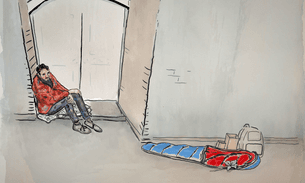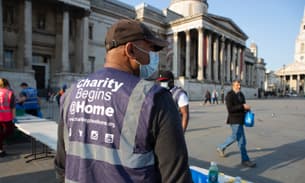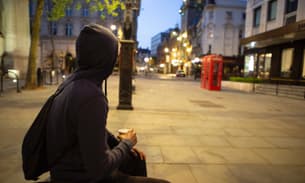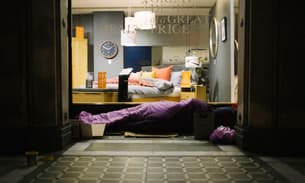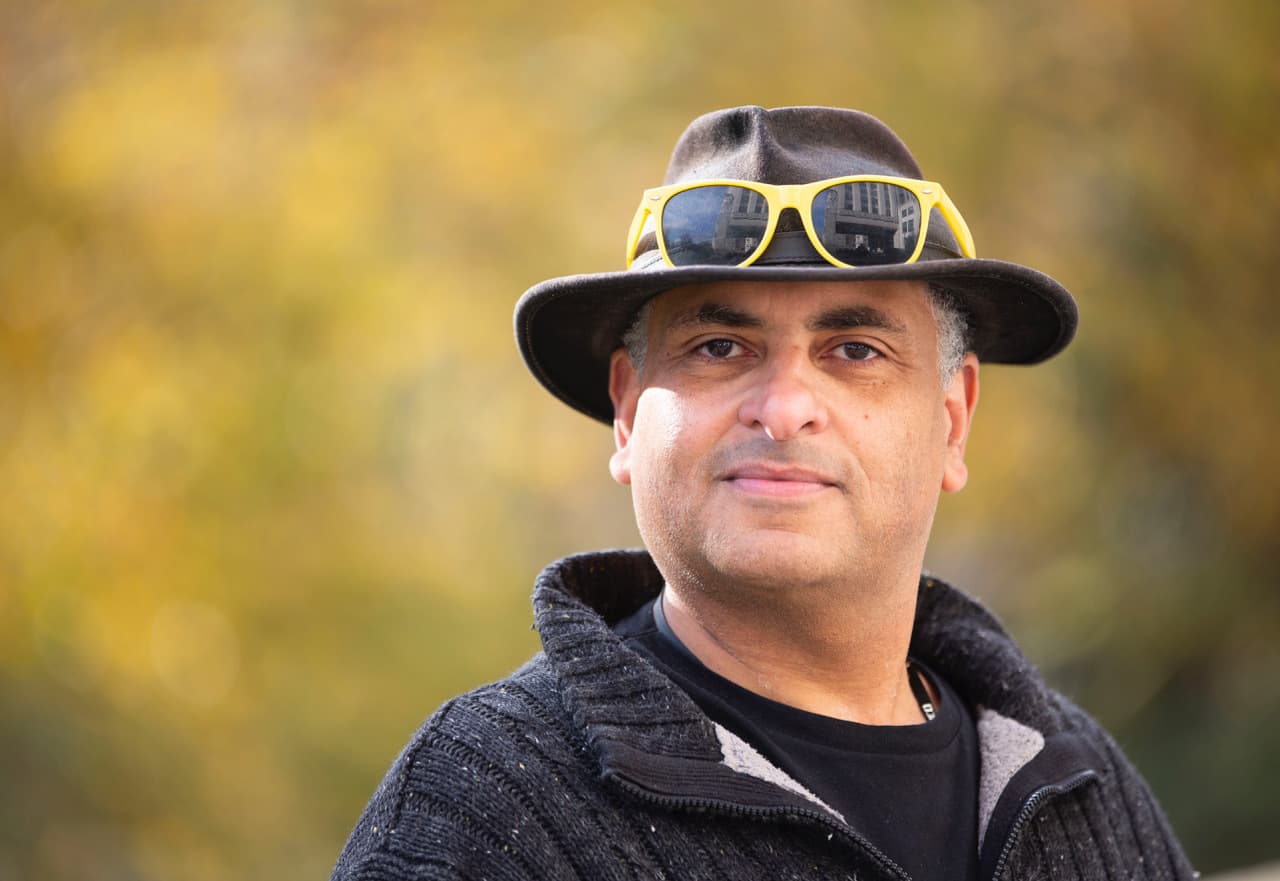
I've gone from homelessness at Heathrow to a hotel. Where next?
As the government pledges money to house those placed in hotels, Paul Atherton says it is too little too late for him
I was in Heathrow Airport Terminal 5, a place I have used as a bedroom for the past two years, when I first heard of Sadiq Khan’s plan to house the homeless in hotels to protect them, as he put it, from Covid-19. I’ve been homeless for over a decade and have experienced it in all its variants; sofa-surfing, homeless hostels, temporary accommodation, night-shelters, living in my car, sleeping on public transport, a few nights’ rough sleeping and finally at Heathrow.
It’s strange how people perceive you when they hear you are homeless; they think you’ve somehow failed in life. So, many are flabbergasted to learn I’m a fellow of the Royal Society of Arts, that my video-diary forms part of the Museum of London’s permanent collection, and that my work has been collected by the BFI and premiered at the Leicester Square Odeon, the Oxo Gallery, the Camden People’s Theatre and the Coca-Cola billboard on Piccadilly Circus – most of which I’ve accomplished while being without a home.
Since moving to London from Wales in 1999 I’ve always lived along the river – from Tower Bridge to Vauxhall to Waterloo. I claimed housing benefit, and negotiated affordable rents.
Yet in 2009, I lost my home. A simple error on my credit file took me from a good risk to bad, just as I was about to renew my tenancy. It took the Information Commissioner’s Office 18 months to put it right, but by then the stress had triggered my chronic fatigue and, after a three-month stay at St Thomas’s Hospital, my homeless journey began.
It led me through all the channels and initiatives London had to offer, including No Second Night Out, Thames Reach, Crisis and the emergency housing departments of various local authorities.
All of them have failed me, because the system isn’t cohesive. The fundamental obstacle to solving homelessness is the bureaucracies and the people who work for them.
The cap on housing benefit means it is impossible to find anywhere to rent in London. The funds won’t cover the cheapest accommodation and private landlords won’t accept you if you’re on benefits, even though it is now criminal to discriminate. In the past I would often lie and say I was self-employed to avoid the stigma.
The system is also utterly unreliable; in my more than ten years of homelessness my disability benefits have been stopped three times, for more than a year at a time, forcing me to rely on street kitchens for survival.
The only option left to me is social housing, but there isn’t any. Twice, local authorities have told me that they don’t have to assist me, even though I know I have a right to help. When they shrug and say they don’t care what the law says, what do you do?
As I told Bob Blackman MP when he was developing the Homelessness Reduction Bill, it’s not more legislation we need but the power to enforce what is already there.
So you can imagine the elation of hearing Khan say that something was actually going to be done. That joy soon diminished, though, when I discovered that Khan’s programme was a trial, with just an initial 300 rooms for those working with charities supported by the mayor’s office. Nobody I knew at Heathrow had any connection with any of them, myself included.
The following week, on a Friday, the government announced that every homeless person would be in by the end of the weekend. On April Fools day, as if to underline the point, out of nowhere and without warning, a mishmash of charities turned up at Heathrow to do health checks to get people into the emergency hotels. Many believed this urgency was prompted by the media coverage I’d generated about us.
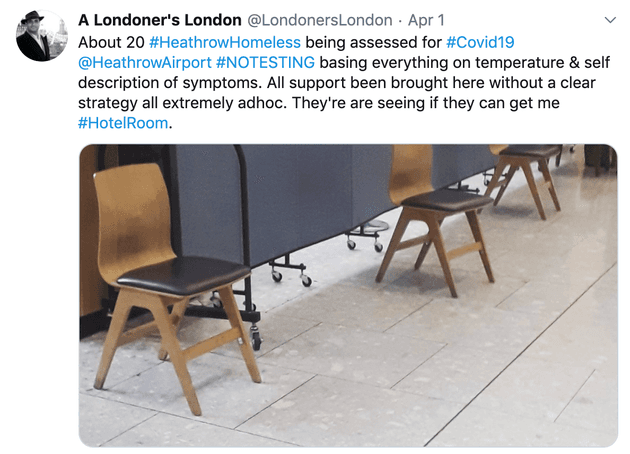
The confusion was palpable, but nonetheless I found myself in an Uber en-route to a Travelodge and then two days later transferred to a hotel apartment in Marylebone, having proved that Westminster council had a duty to house me – I’ve been listed there for six years as a homeless voter, with the disabled parking bay behind the Savoy Hotel, where I used to sleep in my car, as my address.
Oh, the heady days of that first month inside. It’s hard to explain the joy of being able to eat healthily. In Heathrow I’d been living on a single £3 Tesco meal deal a day (sandwich, drink & snack), which often constituted a third of my weekly income.
Now I exercised daily, sucking up my allotted hour discovering places I’d never visited before. I lost weight, drank water regularly, did my ab work-outs. When I needed a shave, I walked into a bathroom, instead of co-ordinating a free one from a barber’s school on the other side of London. Just changing into clean clothes after having a shower felt like the equivalent for most people of finding the Kohinoor diamond under the sofa.
The homeless story was front and centre in the news, with streets silenced and businesses stopped. Never before had we so clearly seen the homeless trapped in a wasteland akin to an episode of The Walking Dead. For once my voice counted; I was in the press every week of that first month.
I let optimism creep in, although even then I thought change had to happen quickly, before things were dragged back to normal.
 A shave became a matter of walking into a bathroom, not crossing London to reach a barbers' school
Paul Atherton
A shave became a matter of walking into a bathroom, not crossing London to reach a barbers' school
Paul Atherton
By month two, that hope had been quashed. It’s back to business as normal, with everyone having to fend for themselves when it comes to finding housing as we come out of lockdown. I’ve been told I have until July 3 before I will be sent back out on the streets.
Not knowing what happens next has prompted nigh on daily “crashes”, a symptom of my chronic fatigue. The constant struggle with this incurable and untreatable illness is relentless. If I’m not trapped in bed unable to move, I’m suffering brain fog and can’t keep my concentration. At its worst, I can’t even speak.
While the government announced £105m to fund accommodation for the homeless this week, all they've done for me is create more uncertainty. I've yet to hear anything to the contrary and will still have to move out on July 3. I imagine that to be eligible for these funds I need my council to agree they have a responsibility to help me – I’ve been struggling to get that.
What has happened to those of us in hotels feels like a huge missed opportunity. The media is now moving on to other stories. Any chance of looking forward to a settled life and future has gone. I’m already cutting down on my food shopping to hoard funds.
What the government should have done, of course, was spend the past three months acquiring properties so there would be accommodation for everyone in the emergency hotels to move into. They could have started with the almost 25,000 empty homes in London. The announcement of extra funds comes too little, too late for me.
Housing me should have been the simplest of all cases for the government to solve. I have no addictions, no long-term mental health problems, am an excellent money manager and entirely self-sufficient. All they’d need to do is find me a hotel apartment like the one I’ve been staying in and pay for it annually upfront (or preferably for five years to give the illusion of some kind of permanent tenancy) so they can negotiate it beneath the benefit cap. Then just make sure my disability benefits are never stopped again and they’d be done.
That truly is all it would take.
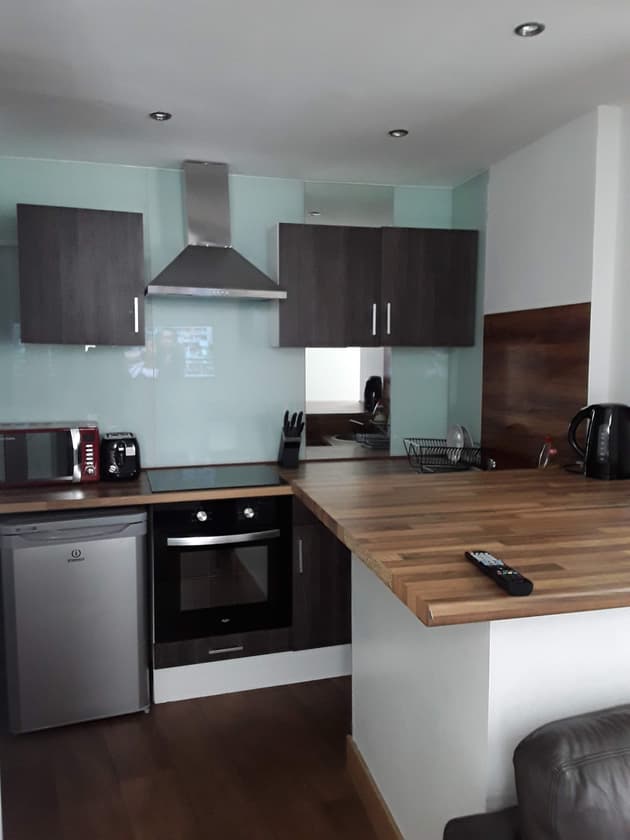 Paul's hotel accommodation. The kitchen has allowed him to eat regular healthy meals for the first time in years
Paul Atherton
Paul's hotel accommodation. The kitchen has allowed him to eat regular healthy meals for the first time in years
Paul Atherton
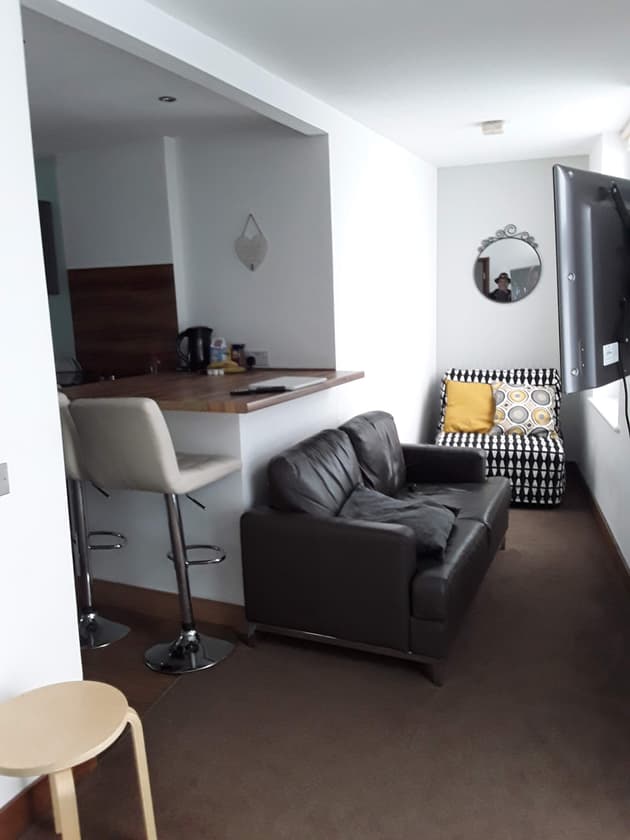 Paul has been told he must leave his accommodation on July 3
Paul Atherton
Paul has been told he must leave his accommodation on July 3
Paul Atherton
Instead I’ll end up back sleeping at Heathrow, living on a poor diet, struggling to sleep, worrying about my benefits and how much life I’ve actually got left.
The life expectancy for a homeless man is 45. I’m already well past my sell-by-date, but I want to be still there for my 20-year-old son in years to come.
Things have got to change in Britain to accomplish that. Sadly, it’s now obvious that is not going to happen.
 Paul with his son, Charles Atherton-Laurie, last summer
Paul Atherton
Paul with his son, Charles Atherton-Laurie, last summer
Paul Atherton
Got a Story?
We welcome tip-offs from the public and we always protect our sources
Find out how to work with usHeader image: Paul Atherton. Credit: Darren Fletcher Photography

